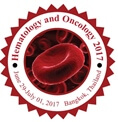Rizza T. Antenor
Southern Philippines Medical Center, Philippines
Title: Incompatible Blood Transfusion in Autoimmune hemolytic Anemia in an Adult Asymptomtic Hepatitis B carrier: A case report
Biography
Biography: Rizza T. Antenor
Abstract
Autoimmune hemolytic anemia is an uncommon condition caused by antibodies directed against red blood cells causing their premature destruction. Clinical manifestations include anemia, jaundice, splenomegaly, reticulocytosis, elevated serum bilirubin, and positive direct antiglobulin test. AIHA can either be idiopathic or secondary to an underlying disease process. Infection accounts for 5% of cases of secondary AIHA. AIHA in asymptomatic hepatitis B carrier is rare with only 2 cases reported worldwide. Both cases were pediatric patients. We are presented with a case of a 27 year old male who came in due to anemia. Patient presented with the classic manifestation of AIHA and workup for underlying cause revealed a carrier state of Hepatitis B infection. Patient was unresponsive to steroid and was persistently dyspneic and tachycardic. Blood transfusion with an incompatible blood was done which resolved the patient’s symptoms. Steroid remains to be the mainstay of treatment for AIHA. However, blood transfusion may be beneficial to symptomatic patients at risk for complications of severe anemia. Although sustained remission is typical in inactive carriers of hepatitis B, reactivation remains a possibility, hence, patient education and good follow up is essential.

